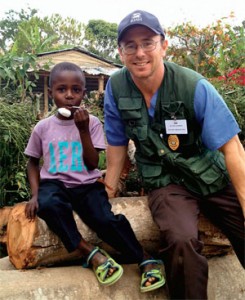In the News: Kramer ’88 Leads Medical Missions to Haiti
 By Sharon Sanders
By Sharon Sanders
“Even the smallest amount of medical attention to the orphans and villagers makes a huge difference in health. As I return years after my maiden trip, the scrawny children I first treated are now big and strong, towering above me with huge smiles,” says Dr. Eric Kramer ’88.
In February, Kramer will embark on his fifth annual medical mission to Haiti. The bootstrap volunteer team includes nurses, medical technicians, paramedics, a pastor, a mechanic, and a carpenter. They transport medications, reading glasses, hygienic goods, beans, rice, children’s shoes, and other supplies.
“I was motivated to take my first trip as a result of the 2010 earthquake,” says Kramer, an emergency physician at Sentara Rockingham Memorial Hospital, Harrisonburg, Va. “We connected with Haitian pastor Geordany Joseph and set up a spontaneous clinic at his Mt. Carmel orphanage in the interior highlands northeast of Port-au-Prince.”
The mission “took on a life of its own,” funded by donations, bake sales, grants, and volunteers who pay their own travel expenses. They return to the same villages in the interior highlands—Pignon, Hinche, and LeJeune—and have sponsored some of the residents through nursing and medical school in the hope of some day building a health clinic, which they would supplement during their annual visit.
A more immediate agenda, however, is administering anti-worm medicine. “Helminths, parasitic worms, are endemic. Some can be quite devastating, especially to children, as they leach ingested nutrients and exacerbate malnutrition. Some cause heart and central nervous system problems,” says Kramer, who graduated with an AB interdisciplinary degree in biology and psychology and earned a medical degree at George Washington University. Kramer says he chose the medical profession because of encouragement from his mentors—Alan Childs, professor of psychology, and Christopher Wilson, former professor of psychology.